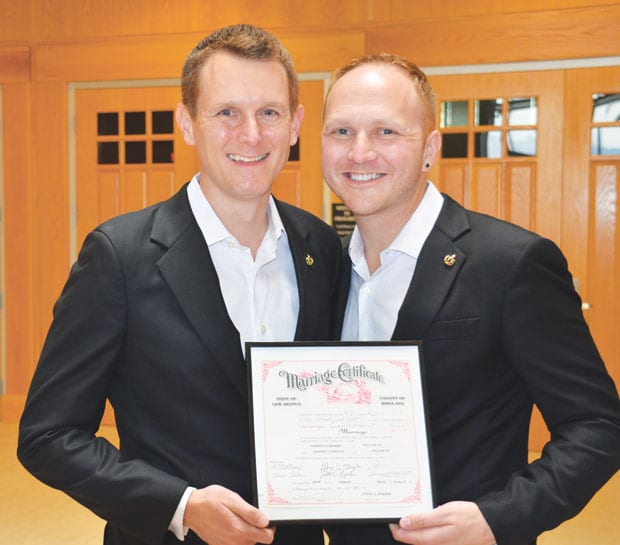
NO MORE WAITING | Dallas couple Jerrett Morris, left, and Jef Tingley married in New Mexico the week it became legal. (Courtesy Photo)
The momentum pushing same-sex marriage built up steadily throughout the year. By year’s end, 18 states, the District of Columbia and eight Native American tribes that includes one Oklahoma county had marriage equality covering more than 39 percent of the U.S. population.
Several Legislatures began debating marriage equality bills when their sessions opened in January.
Rhode Island’s Legislature became the first to pass a marriage equality bill on May 2. The state was the last in New England to legalize same-sex marriage. Its previous civil union law was extremely unpopular and few took advantage of it.
Anyone in Rhode Island could drive less than 20 miles to a marriage equality state.
A week later, with little opposition, Delaware’s Legislature passed marriage equality.
After Minnesota voters turned down an anti-marriage amendment by a large margin in November 2012, the gay and lesbian community quickly organized and used that momentum. On May 14, the Legislature passed marriage equality.
In June, the U.S. Supreme Court ruled in two marriage equality cases.
In California’s Proposition 8 case, the court ruled the plaintiffs had no jurisdiction to defend the law so the Ninth District Court of Appeals’ decision stood. That court found Prop 8 was driven by animus against same-sex couples and violated the due process and equal protection clauses of the 14th Amendment.
As a result of that ruling, California became the fourth new marriage equality state of the year.
In August, a county clerk in Las Cruces, N.M. began issuing marriage licenses to same-sex couples. He said in his reading of the state constitution and under state law, there is no mention of gender in marriage law. Over the next month, several other county clerks followed suit. In several other counties, courts ordered county clerks to issue licenses.
The county clerks realized that having a patchwork of counties issuing licenses in the state was unworkable and asked the state Supreme Court for a ruling. The court made marriage equality a statewide right on Dec. 19.
In New Jersey, the state superior court ruled the state’s civil unions were not equal to marriage as required under state law and ordered marriage equality to begin. Gov. Chris Christie filed an appeal to the state Supreme Court but he withdrew it after that court refused to issue a stay.
New Jersey began issuing marriage licenses on Oct. 21.
In October, Hawaii Gov. Neil Abercrombie called a special session of the Legislature to consider marriage equality.
The opposition argued the state passed a constitutional amendment that stopped it from becoming the first marriage equality state in 1998. However, unlike amendments in other states that forbid marriage equality, Hawaii’s amendment only allows the Legislature to define marriage. In 1998, the Legislature defined marriage as only between a man and a woman. The new law removed that restriction.
The first same-sex weddings took place in Hawaii on Dec. 2.
A bill to upgrade Illinois’ civil union law to marriage equality stalled most of the year. As rulings from the federal government, after the Defense of Marriage Act fell, made it evident civil unions were not equal to marriage, the state House of Representatives finally passed a bill on Nov. 5, amending an earlier Senate bill. The Senate quickly passed the House version, and the governor signed the bill into law on Nov. 20.
Marriage equality doesn’t begin in Illinois until June 1, 2014, but marriages have begun. If one partner is terminally ill, the couple is allowed to marry immediately.
On Dec. 20, a judge ruled Utah’s anti-marriage constitutional amendment was illegal and ordered licenses to be issued immediately. The state requested a stay but the U.S. Court of Appeals denied the request. Unless the Supreme Court stops it, Utah is marriage equality state No. 18.
Marriage equality also began in one county in Oklahoma.
A gay couple living on the Cheyenne and Arapaho reservation asked if they could get a marriage license. Since tribal nations are not bound by state law, and the Arapaho and Cheyenne Constitution bans discrimination based on sexual orientation, they were given a marriage license along with several other same-sex couples. That made a number of state legislators and the governor very unhappy, but the marriages are valid under federal law.
This article appeared in the Dallas Voice print edition December 27, 2013.

